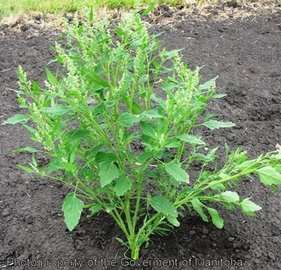Researchers have found these seeds can survive for years
By Patrick Lynch
Farms.com
There are numerous research papers looking at this question. It is hard to do research on this topic. How do you have “natural” conditions? How do you know how many weed seeds were there at the start?
Researchers bury weed seeds or plant them to get an idea. The results showed that annual grass seeds germinated earlier than broadleaf weed seeds. Typically, over 50 per cent of annual grasses germinated in the first year. Bad news is that there were still 4 per cent of grass seeds viable after 17 years.
Annual broadleaf weeds had a similar germination pattern with fewer germinating in the first years and more still viable in the longer term (11 per cent of broadleaf weeds were still viable after 17 years.)
Research from Minnesota showed that there were over 130 million weed seeds/ac. In this study surprisingly wild oats only lived for three to six years but lived longer if buried deeper.

Lamb's quarters
Photo" Manitoba Agriculture
Another study reported that lamb’s quarters can live for 40 years. All of this suggests that we have to go back to “weed free” fields. Especially since we have so many resistant species.
Dow’s new Enlist™ and Monsanto’s Roundup Ready 2 Xtend™ will help control some already herbicide-resistant species but this resistance will also break down eventually. You have to be conscious of building the weed seed bank. Use of cover crops is the most economical way to reduce some weeds from setting seeds.